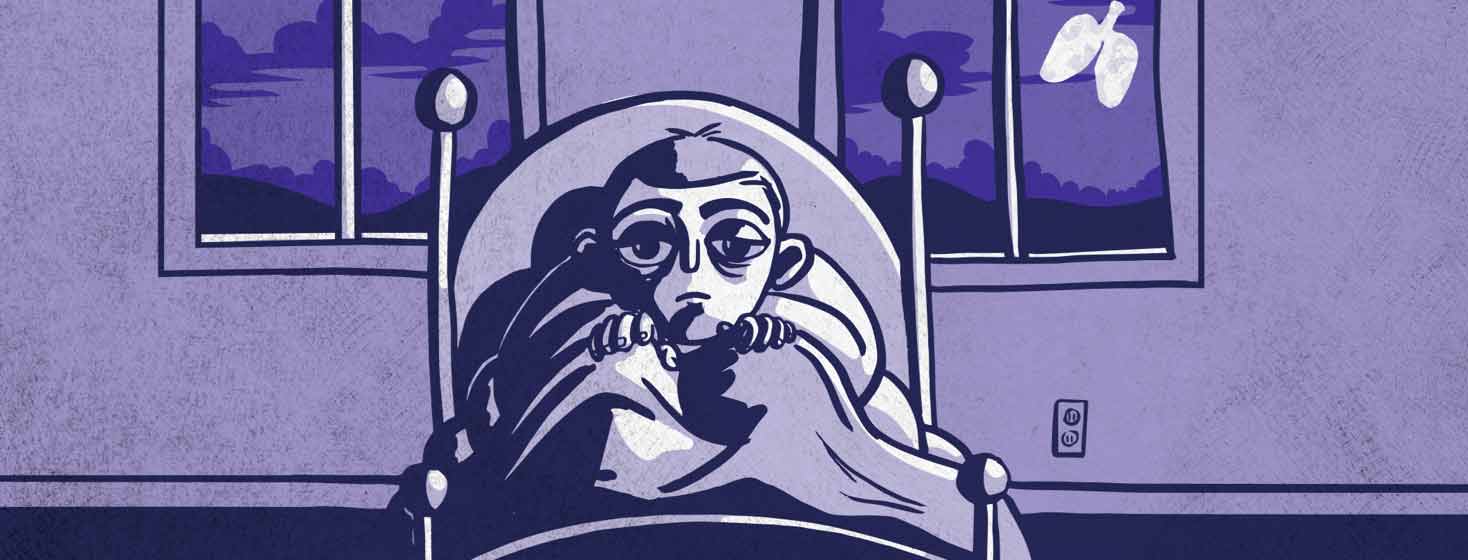When Asthma Gets in the Way of a Good Night’s Sleep
Insomnia frequently occurs in people living with other medical conditions, including asthma. Asthma describes a situation where one’s bronchial airways become swollen, leading to chest tightness, shortness of breath, wheezing, and coughing.
Someone with asthma may also face more sensitivities to allergens and irritants. These can cause flare-ups, both day or night. Unfortunately, these flare-ups are tied to insomnia.
Asthma and insomnia: problematic breathing and poor sleep
The term comorbidities describes 2 primary conditions which happen simultaneously and may affect each other. In the case of asthma and insomnia, the comorbidity is clear. If you can’t breathe and you’re trying to sleep, you’ll struggle. Meanwhile, people who miss sleep may find that this insomnia or sleep fragmentation can worsen their asthma.
How can someone with both conditions avoid the perpetual problem of poor sleep and problematic breathing?
When asthma affects your sleep
Asthma is known to flare up at night. Doctors call this nocturnal asthma. Nocturnal asthma happens in about 75 percent of people with asthma, occurring at least once weekly. However, as many as 4 out of 10 people with asthma may face nightly bouts of nocturnal asthma.1
Triggers to look out for may include:2
- Smoking, even when secondhand
- Allergens in bed linens, mattresses, and pillows
- Food sensitivities, such as to sulfites
- Cold air temperature, a common asthma trigger
- Respiratory infections
Also problematic: asthma medication. While it’s necessary to clear breathing passages, it also generates a stimulating response which can lead to more lost sleep.3
When insomnia affects your asthma
Sleep loss by any means will cause inflammation in the body. It’s this inflammation that affects the airways, causing the swelling that precedes an asthma attack.
People with asthma who sleep less than 6 hours a night may be more likely to experience episodes of asthma and poor quality of life than those who sleep between 7 and 9 hours each night.4
What can you do about these comorbidities?
Treat your asthma:
Ways to treat your asthma include:5
- Control your asthma through both quick-relief and long-term control medications. Keep medications and water on your nightstand, just in case.
- Keep bedding clean, using hypoallergenic products.
- Disallow pets in your sleeping space; their dander and saliva may trigger asthma.
- Avoid scented products at bedtime.
- Practice stress management before bed; stress is a known asthma trigger.
- Keep windows closed; the temperature outside may be too cool, plus open windows allow pollen, pollution, and other allergens in.
- Daytime exercise supports lung function and boosts the immune system. It’s also helpful for supporting circadian rhythms so that you can more easily fall asleep at night.
Treat your insomnia:
Ways to treat your insomnia include:5-7
- Talk to your doctor about insomnia; they could adjust medication types or doses, refer you to a practitioner of CBTi (cognitive behavioral therapy for insomnia), and give you other tips for achieving sleep while avoiding nocturnal asthma.
- If you suspect you have or have already been diagnosed with anxiety or depression, make sure it’s treated as well.
- Sleeping on your side can do 2 things: it can take the pressure off your chest and lungs, and it can prevent acid reflux, a common trigger for both insomnia and asthma.
- Breathing exercises to calm the mind can benefit people who can’t sleep.
- Recent research suggests that using supplemental melatonin may worsen asthma. Melatonin isn’t an insomnia drug; it won’t cause you to fall asleep like a sleeping pill might. Instead, it’s a substance that supports circadian rhythms. However, asthma may be caused by circadian rhythm disruptions, in which levels of hormones, such as melatonin, may be out of balance. Taking melatonin can further exacerbate this situation.
- Consider getting a sleep apnea screening, as this sleep breathing disorder, which can also cause insomnia when left untreated, is common among people with asthma.
A note about seniors with asthma and insomnia
Asthma may be considered a young person’s condition, but as many as 13 percent of people over the age of 65 also have asthma, though some researchers think this is an underestimation. It’s often underdiagnosed in the aging population. A recent study found that 40 percent of people aged 60 or older with asthma also experienced insomnia as a comorbid condition.8,9
These people were more likely to experience more limitations while managing activities of both simple and more complex activities of daily living (ADL), especially if they also dealt with clinical depression.
Depression is closely linked to insomnia. People who can’t sleep face a 10 times higher risk of developing depression.10
Given this reality, the study authors suggest that the “assessment and treatment of insomnia and depression in older adults with asthma may be important for maintaining active, independent living.”9Do you have both insomnia and asthma? Please share your experience with the community in the comment section.

Join the conversation